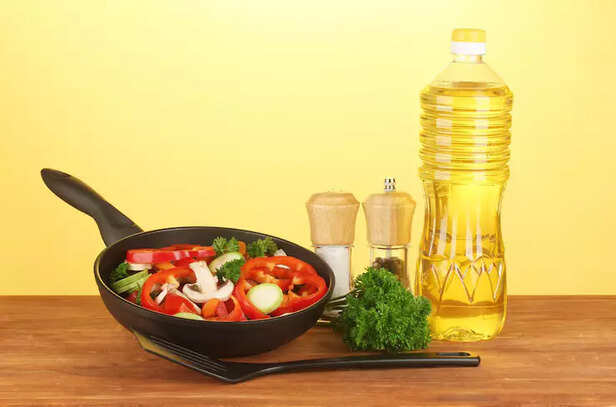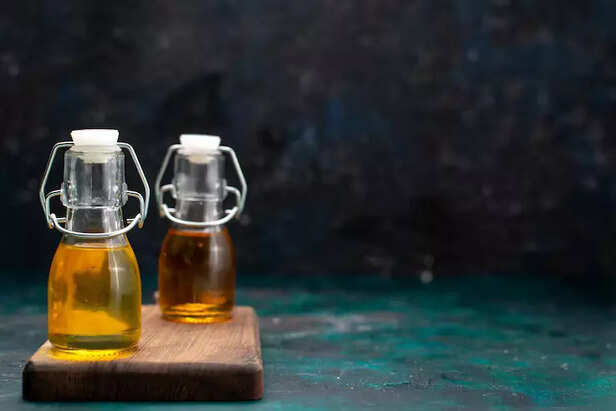Ghee vs Refined Oil: The Health Revelation You Can’t Ignore
Amritansh Nayak | May 03, 2025, 12:43 IST
( Image credit : Timeslife )
This article examines the nutritional, processing, cooking suitability, and cultural significance of ghee, cold-pressed oils, and refined oils. Find out why, for improved flavor and health, ancient fats like ghee and cold-pressed oils are making a comeback in contemporary kitchens.
Different fats have different properties when it comes to cooking oils. Traditional choices like ghee and cold-pressed oils are becoming more and more popular because of their higher health advantages, while refined oils still dominate grocery shelves because of their low cost and neutral taste. The way these fats are handled and utilized can affect not just flavor but also long-term health due to factors including nutritional value and cultural importance. Let's examine the differences between these three popular cooking fats and determine which one is actually appropriate for your kitchen.

The nutritional composition and physiological effects of ghee, refined oils, and cold-pressed oils vary greatly. The majority of the natural nutrients found in cold-pressed oils, such as monounsaturated (MUFA) and polyunsaturated (PUFA) fats, vitamin E, and plant-based antioxidants, are preserved since they are extracted without the use of heat or chemicals. By lowering inflammation and enhancing cholesterol profiles, these good fats promote heart health. Refined oils, on the other hand, are processed using high heat and chemicals, which removes the majority of their natural nutrients. Even while they might still have some MUFA or PUFA, they frequently don't have antioxidants, and they might even have traces of dangerous substances that were created during refining. Frequent use of refined oils has been associated with increased inflammation and oxidative stress in the body.
Saturated fats, fat-soluble vitamins A, D, E, and K, and short-chain fatty acids like butyrate, which promote metabolism and intestinal health, are abundant in ghee, or clarified butter. Moderate ghee use, particularly in traditional diets, has not been substantially linked to heart disease despite being heavy in saturated fat, and in certain situations, it may even benefit lipid profiles. For everyday cooking aimed at long-term health, cold-pressed oils and ghee (in moderation) are superior than refined oils since they provide more nutritional advantages.

The temperature at which an oil begins to degrade and emit visible smoke is known as the smoke point. At this point, the oil starts to break down, producing toxic substances such free radicals and acrolein that can have a detrimental impact on taste and health. Selecting the appropriate fat for different cooking techniques requires an understanding of smoke points. The greatest smoke points are usually found in refined oils, which are ideal for high-heat cooking methods like deep-frying and stir-frying because they are frequently above 400°F (204°C). Refined soybean, canola, and sunflower oils are a few examples. But because of their considerable processing, they lack nutrients even if they are stable.
With lower smoke temperatures (usually between 250°F and 375°F), cold-pressed oils—like extra virgin olive oil or cold-pressed mustard oil—are better suited for low-to-medium heat cooking, such as sautéing or pouring over completed foods. In addition to destroying their flavor and antioxidants, overheating these oils can turn them poisonous. Conversely, ghee is quite stable and has a relatively high smoke point (around 450°F or 232°C), which makes it perfect for most cooking techniques, including frying. It is a safer and healthier choice for high-heat cooking because of its inherent antioxidant content, which also improves stability.

The nutritional value, flavor, and purity of oils and fats are all greatly impacted by the processing method used. Mechanical pressing is used to obtain cold-pressed oils without the use of heat or chemicals. Natural nutrients like vitamins, vital fatty acids, and antioxidants are preserved with this technique. Cold-pressed oils are more perishable and should be kept in cool, dark locations since they are barely processed, meaning they are free of additives and maintain their original flavor and aroma. On the other hand, refined oils go through a lengthy processing procedure that includes bleaching, deodorizing, high heat, and chemical solvents like hexane. In addition to eliminating contaminants, these procedures eliminate the majority of the advantageous substances. Refined oils may have preservatives and chemicals to extend their shelf life and enhance their look.
They have a more neutral flavor and are more stable, but their nutritional profile is greatly reduced. The conventional method of making ghee involves gradually heating butter to exclude water and milk particles, leaving just pure butterfat. Its shelf life is naturally increased by this method, negating the need for preservatives. Many people with dairy sensitivity can use ghee because it is free of lactose and casein and yet contains fat-soluble vitamins including A, D, E, and K. All things considered, cold-pressed oils and ghee are purer and more nutritious than highly processed refined oils.

Ghee and cold-pressed oils are both long-standing cultural and culinary staples in traditional Indian cookery. A mainstay in Indian homes, ghee is frequently used to enhance rice and lentils, prepare sweets, and temper spices. It is very popular for taste and digestion because of its silky texture and rich, nutty flavor. Throughout India, cold-pressed oils such as mustard, sesame, and coconut oil are utilized regionally; in the north, mustard oil is used, in the south, and along the coast, coconut oil is used. These oils give local cuisine unique flavor profiles and nutritional benefits. Refined oils lack the depth of flavor and traditional roots that ghee and cold-pressed oils provide, yet being widely used in modern kitchens due to their cheap and neutral taste.
Ghee is highly valued in India's traditional medical system, Ayurveda, which refers to it as "sattvic"—pure, nutritious, and good for the body and mind. It is thought to stimulate general Vigor, enhance nutritional absorption, and facilitate digestion. Depending on the person's body type (dosha), cold-pressed oils are also prized in Ayurveda, however refined oils are generally discouraged. Traditional fats like ghee and cold-pressed oils are becoming more popular in modern cookery due to their superior taste, digestibility, and overall health benefits, even if processed oils are more convenient.
Beyond only adding taste, ghee and cold-pressed oils also contribute vital minerals, digestibility, and age-old knowledge. These natural fats promote cardiac, digestive, and metabolic health, in contrast to processed oils, which frequently sacrifice health for convenience. Selecting ghee or cold-pressed oils for regular cooking can be a significant step towards a more healthful and nourishing lifestyle, but moderation is essential.
Explore the latest trends and tips in Health & Fitness, Travel, Life Hacks, Fashion & Beauty, and Relationships at Times Life!

is refined oil is good for you?
( Image credit : Timeslife )
Nutritional Characteristics and Health Effects
Saturated fats, fat-soluble vitamins A, D, E, and K, and short-chain fatty acids like butyrate, which promote metabolism and intestinal health, are abundant in ghee, or clarified butter. Moderate ghee use, particularly in traditional diets, has not been substantially linked to heart disease despite being heavy in saturated fat, and in certain situations, it may even benefit lipid profiles. For everyday cooking aimed at long-term health, cold-pressed oils and ghee (in moderation) are superior than refined oils since they provide more nutritional advantages.

impact on health
( Image credit : Timeslife )
Smoke Point and Applicability for Cooking
With lower smoke temperatures (usually between 250°F and 375°F), cold-pressed oils—like extra virgin olive oil or cold-pressed mustard oil—are better suited for low-to-medium heat cooking, such as sautéing or pouring over completed foods. In addition to destroying their flavor and antioxidants, overheating these oils can turn them poisonous. Conversely, ghee is quite stable and has a relatively high smoke point (around 450°F or 232°C), which makes it perfect for most cooking techniques, including frying. It is a safer and healthier choice for high-heat cooking because of its inherent antioxidant content, which also improves stability.

cold press oil
( Image credit : Timeslife )
Purity & Processing Techniques
They have a more neutral flavor and are more stable, but their nutritional profile is greatly reduced. The conventional method of making ghee involves gradually heating butter to exclude water and milk particles, leaving just pure butterfat. Its shelf life is naturally increased by this method, negating the need for preservatives. Many people with dairy sensitivity can use ghee because it is free of lactose and casein and yet contains fat-soluble vitamins including A, D, E, and K. All things considered, cold-pressed oils and ghee are purer and more nutritious than highly processed refined oils.

benefits of ghee
( Image credit : Timeslife )
Digestibility, Taste, and Cultural Use
Ghee is highly valued in India's traditional medical system, Ayurveda, which refers to it as "sattvic"—pure, nutritious, and good for the body and mind. It is thought to stimulate general Vigor, enhance nutritional absorption, and facilitate digestion. Depending on the person's body type (dosha), cold-pressed oils are also prized in Ayurveda, however refined oils are generally discouraged. Traditional fats like ghee and cold-pressed oils are becoming more popular in modern cookery due to their superior taste, digestibility, and overall health benefits, even if processed oils are more convenient.
Beyond only adding taste, ghee and cold-pressed oils also contribute vital minerals, digestibility, and age-old knowledge. These natural fats promote cardiac, digestive, and metabolic health, in contrast to processed oils, which frequently sacrifice health for convenience. Selecting ghee or cold-pressed oils for regular cooking can be a significant step towards a more healthful and nourishing lifestyle, but moderation is essential.
Explore the latest trends and tips in Health & Fitness, Travel, Life Hacks, Fashion & Beauty, and Relationships at Times Life!
